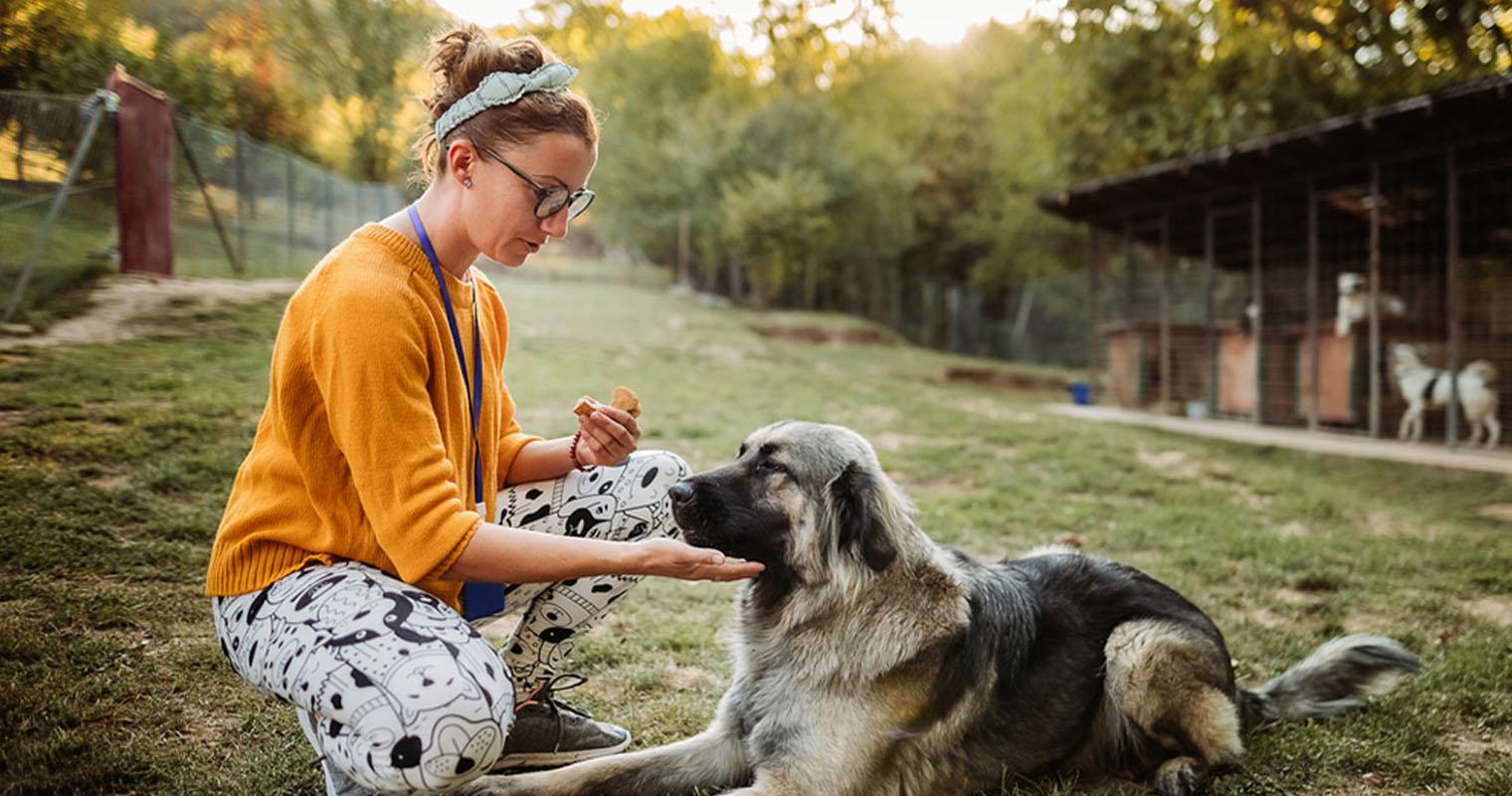Where to Adopt a Pet: Shelter, SPCA, Humane Society, or Rescue?
Looking to adopt, but not sure which type of pet adoption organization is right for you?
Looking to adopt, but not sure which type of pet adoption organization is right for you?
by Julie Zeilinger, | March 11, 2024

StefaNikolic / iStock
You’ve researched what type of pet would be the best match for your lifestyle, read up on training, pet-proofed and prepped your home, and even tossed around a few name ideas. Your schedule for the next few weeks is open. You are ready to adopt a pet, and maybe you’ve even searched for one on Adopt a Pet, our resource that draws from local shelters, humane societies, and pet rescue organizations. But before you click on an irresistible furry face in the search results, how do you know which type of pet adoption organization is right for you?
While they vary tremendously from community to community, here’s some information about the different types of pet adoption organizations to help you know what to expect from each because informed adoption is a better experience for everyone.
Shelters, SPCAs, humane societies, and rescue organizations have one very important thing in common: they all offer basic necessities, like shelter and food, to animals in need.
Shelters, SPCAs, and humane societies are often the first stop after a dog is found homeless or surrendered by their family. Some of these organizations offer comprehensive veterinary services — like vaccination and spay/neuter procedures — while others may not or may provide very limited services. In shelters, SPCAs, and humane societies, pets are likely to be kept in kennel boarding facilities, which can be very stressful environments for pets.
Many rescues have their pets stay with foster families, which is not only a less stressful environment for most pets but one in which a foster family can get to know the pet’s temperament and personality better and help a potential adopter determine if the pet will fit into their family. Most rescues also provide veterinary care, and some even consider themselves “medical rescues,” meaning they specifically focus on rehabilitating animals with medical problems.
Before you adopt from an animal shelter, understand that most shelter pets have an unknown history. Shelters in large cities especially have a large number of pets coming in every day, and while some may label themselves as “no kill” or have an “open admission” policy, which means they don’t turn away animals, those labels don’t always tell the whole story of a shelter’s policy. For example, to be considered no-kill organizations need to have a placement rate of 90 percent or higher, which still leaves 10 percent of animals who may be euthanized for various reasons. Essentially, it’s important to ask questions and do research to determine if a shelter is humane.
If you decide to adopt from a shelter, bring your entire family to choose a pet and spend plenty of time with the pet you want to adopt outside of their kennel in an adoption office, play yard, or even just a hallway or lobby. Many shelters have volunteers that help the adopting public, but some have little to no formal screening process — it’s up to you to select a pet who will be a good match for your home.
Be prepared to help your pet adjust to their new home once you bring them home. For example, cats will likely need some personal space while they acclimate to their new environment, and both cats and dogs will need to be slowly, properly introduced to any pets you already have. It may be a good idea to enlist the help of a trainer or adoption-experienced friend to help you through the normal adjustment of a new pet in a new home, especially if you have other pets or children.
You should also take your new pet to your vet for a full checkup, especially if the pet is a kitten or puppy, and understand that you may have to help them get through a common shelter cold in the first few weeks.
Many people think that the Humane Society of the United Society runs all humane societies or that the American Society for the Prevention of Cruelty to Animals (ASPCA) runs all SPCAs, but they don’t — “Humane Society” and “SPCA” are descriptive words for independent organizations.
Like shelters, some humane societies and SPCAs are “limited admission,” which means they do not have to euthanize animals to make room, while others are “open admission” and have contracts with local animal control bodies, which means they euthanize to make room for new animals. These labels are significant and affect their adoptable animals. For example, limited admission organizations often use foster homes, which can help support pets in skills like training and lead fosters to learn more about the pet’s temperament and personality.
It’s also important to note that adoption fees vary greatly depending on the organization: In Southern California, for example, adoption fees can range from $20 to $325.
Rescue organizations vary quite a lot: some use foster homes while others use boarding kennels; rescues can be non-profit organizations or private individuals. Generally, though, these organizations will ask prospective pet parents to fill out an adoption application, conduct a phone or in-person interview, and ask to visit your home to evaluate it for the safety of the particular pet you’re interested in adopting. Because rescues pour so much time, love, and money into their pets, their adoption fees can be higher than shelters’ or humane societies and generally range from $150 to $400.
This process and fee may sound like a lot, but in return, you typically get a lot back: a pet whose behavior and medical history are well-known, after-adoption support, and a solid return policy should the pet not be a match for your home. Each rescue is different, though, so make sure to ask about their policies if you go this route.
First and foremost, if you have a concern about your local shelter or rescue, it’s important to have as much information about the organization and what concerns you as possible, according to the Humane Society of the United States. This may involve connecting with the organization and expressing that concern or asking to learn more about your concern.
If that’s not possible, or connecting with them does not resolve your concern, you can reach out to the organization’s board of directors, which is typically listed on the organization’s website, or contact a municipal agency that oversees the organization.
If you think someone you know is abusing or neglecting an animal, or you have witnessed that abuse yourself, you should report your suspicions to the appropriate enforcement authorities, according to the ASPCA. Those enforcement authorities could be the local police or animal control, but the correct enforcement body may vary depending on where you are because there are no national or even statewide systems for reporting such abuse. If you’re unsure of who to contact, visit the National Link Coalition, which can help you find the current procedures for reporting in your state and/or local community.
Here are some tips for finding a good pet adoption organization:
Ask your friends, family, and veterinarian for recommendations.
Do an online search for pet adoption organizations in your area via adoptapet.com/animal-shelters
Read reviews of different organizations before you visit.
Visit the organization in person and meet the staff and animals.
Ask questions about the organization’s policies and procedures.
Make sure you feel comfortable with the organization before you adopt a pet.
If you have a concern about a shelter or rescue, you can reach out to the organization’s board of directors or contact a municipal agency that oversees the organization.
If you’re unsure of who to report animal abuse or neglect to, the National Link Coalition can help you find the current procedures for reporting in your community.
Shelters and rescues offer different pros and cons — see above for more information about each.
An animal rescue’s phone number or preferred form of contact is generally listed on their website or social media pages.
Shelters, SPCAs, humane societies, and rescues offer necessities, including food, shelter, and often veterinary care, and help those animals find their forever homes.

Julie Zeilinger is a NYC-based writer and editor whose writing has been published in Marie Claire, Vox, HuffPost, Forbes, and other publications. She is also the author of two books: College 101: A Girl’s Guide to Freshman Year (2014) and A Little F’d Up: Why Feminism Is Not a Dirty Word (2012). She is the mom to Baloo, a two-year-old Bichpoo and foster mom to dogs via Badass Animal Rescue.